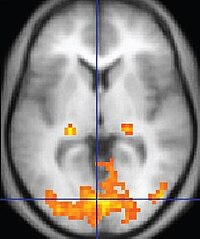
Photo from wikipedia
Significance Localizing cognitive function to distinct brain areas has been a mainstay of human brain research since early reports that focal injuries produce changes in behavior. Yet, accumulating evidence shows… Click to show full abstract
Significance Localizing cognitive function to distinct brain areas has been a mainstay of human brain research since early reports that focal injuries produce changes in behavior. Yet, accumulating evidence shows that areas do not act in isolation. Here, we evaluate the practical implications of the localizationist perspective by comparing the performance of localizing versus broad-scale statistical procedures in real connectome data (1,000 subjects performing 7 tasks). We find that popular localizing procedures miss substantially more true effects than simple broad-scale procedures. By highlighting the power of simple alternatives, we argue that moving beyond localization is viable and can help unlock opportunities for human neuroscience discovery.
Journal Title: Proceedings of the National Academy of Sciences of the United States of America
Year Published: 2022
Link to full text (if available)
Share on Social Media: Sign Up to like & get
recommendations!